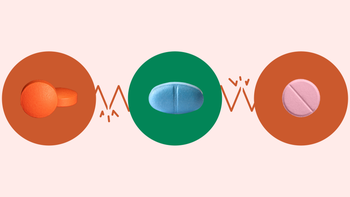
Are Advil (Ibuprofen) and Aspirin the Same Thing?
Key takeaways:
Ibuprofen (Advil, Motrin) and aspirin are common medications used to relieve pain, fever, and swelling. While they have some similarities, they also have slightly different uses.
Aspirin can be taken for certain heart conditions and for the prevention of blood clots.
At higher doses, ibuprofen can be prescribed for moderate pain caused by conditions like rheumatoid arthritis or osteoarthritis.
Table of contents

With so many pain medications available, it can be overwhelming to decide which one to use for pain relief. Ibuprofen (Advil, Motrin) and aspirin are two common over-the-counter (OTC) pain relievers. But how do you decide which is better for you?
Before making a decision, you may pick up the box and read the medication’s label information, looking for uses and side effects. Sometimes the information on different medications can look similar, which can be confusing and make it hard to know which medication to pick. This can be the case with ibuprofen and aspirin.
Below, we’ll take a look at the similarities and differences between ibuprofen and aspirin.
Search and compare options
How do aspirin and ibuprofen (Advil) work?
Ibuprofen and aspirin work in similar ways in the body. They affect a process called the cyclooxygenase (COX) pathway, which plays a significant role in fevers, pain, and inflammation (swelling). But there are slight differences in how the two medications affect this process, as we’ll detail below.
Does Advil contain aspirin?
No, Advil does not have aspirin in it. Aspirin and Advil are separate medications.
The active ingredient in aspirin is salicylic acid. This medication can help relieve fever, pain, and inflammation. It can also prevent platelets (a type of blood cell) from clumping together and forming blood clots.
The active ingredient in Advil is ibuprofen. This medication is also sold under the brand name Motrin. Like aspirin, ibuprofen works to relieve fever, pain, and inflammation. But ibuprofen doesn’t affect platelets as much as aspirin does.
Are aspirin and ibuprofen both NSAIDs?
Yes. Aspirin and ibuprofen both belong to a group of medications known as non-steroidal anti-inflammatory drugs (NSAIDs). All medications in this class affect the COX pathway and can help with pain and inflammation.
What makes aspirin and ibuprofen different?
The main difference between aspirin and ibuprofen is how they affect the COX pathway. There are two main enzymes (proteins) involved in this process: COX-1 and COX-2. COX-1 helps maintain the health of the blood vessels, kidneys, and digestive tract. COX-2 is involved in creating pain and inflammation.
Read more like this
Explore these related articles, suggested for readers like you.
Aspirin strongly blocks COX-1. It has a lesser effect on COX-2. Ibuprofen blocks both COX-1 and COX-2 equally. It’s known as a non-selective NSAID because it blocks both.
Aspirin also affects a substance called thromboxane A2 (TxA2). TxA2 helps tell our platelets when it’s time to form a clot. Aspirin stops TxA2 from delivering this message to the platelets. This allows aspirin to help prevent blood clots. Ibuprofen has a much weaker effect on TxA2, and the effect wears off quickly.
These differences allow each medication to be used for certain conditions where the other would be less effective.
Is ibuprofen a blood thinner like aspirin?
No, ibuprofen is not a blood thinner (anticoagulant). Because its effects on TxA2 are weaker than aspirin, it’s not useful for treating or preventing blood clots. But ibuprofen does have some effect on TxA2, so it can raise the risk of bleeding. This is why you shouldn’t take ibuprofen if you take blood thinners.
Are aspirin and ibuprofen used for the same things?
Aspirin and ibuprofen have similar uses. As mentioned above, both medications can relieve fever, pain, and swelling. But because of how they work, they have a few distinct uses as well.
Other aspirin uses
Aspirin is sometimes also used to relieve symptoms of:
People with certain heart conditions may also be given aspirin for the prevention of heart issues. It can also be used to help prevent repeat strokes in people who have had strokes in the past. When used for these purposes, it’s typically given in the form of a daily low-dose aspirin (75 to 100 mg per day).
Other ibuprofen uses
Ibuprofen is sometimes given at higher doses as a prescription medication (400 mg or greater). Advil is only the brand name for the OTC version of ibuprofen. Prescription-strength ibuprofen can help treat moderate pain caused by certain health conditions, such as rheumatoid arthritis and osteoarthritis. Both OTC and prescription-strength ibuprofen are also effective for relieving mild to moderate menstrual cramps.
Can you take ibuprofen and aspirin together?
No, it’s typically not recommended to take aspirin and ibuprofen together. These medications interact with each other. Taking aspirin with ibuprofen raises your risk for serious side effects, such as stomach ulcers or severe bleeding.
If ibuprofen or aspirin alone isn’t providing enough pain relief for you, discuss next steps with your healthcare provider. They may suggest trying or switching to a non-NSAID pain medication.
If you take a daily low-dose aspirin, discuss the safest pain relief options with your healthcare provider or pharmacist. Possible alternatives to ibuprofen include acetaminophen (Tylenol) and certain pain relief gels or patches.
Which is a better pain reliever, aspirin or ibuprofen?
Determining whether aspirin or ibuprofen is the better option for you depends partly on your health history. All NSAIDs are similarly effective in relieving mild pain. But while they both work well for minor pain, ibuprofen works better for moderate pain.
Before recommending a medication, your healthcare provider will consider the side effects and any other medications you may currently be taking. This can help prevent complications or serious side effects.
If you’re at your local pharmacy and need assistance, talk to a pharmacist. They can help you choose the right OTC pain reliever for your symptoms. They can also check for potential medication interactions.
What are the common side effects of aspirin and ibuprofen?
Aspirin is generally well-tolerated. The most common side effect is stomach upset or stomach pain. Taking aspirin with food can help relieve this. But if these side effects don’t go away, they could be a sign of more serious problems, such as stomach ulcers or bleeding. Be sure to contact your healthcare provider if you experience severe stomach pain that doesn’t go away.
Ibuprofen is well-tolerated as well. It’s most common side effects include:
Dizziness
Stomach discomfort
Heartburn
Nausea
Ibuprofen also carries a risk of stomach bleeding and ulcers. It’s recommended to only take OTC ibuprofen for 10 days in a row when using it for pain or 3 days in a row for fever. After that, you should speak with your healthcare provider. Taking ibuprofen for too many days in a row can raise the risk of serious side effects.
Which is safer: aspirin or ibuprofen?
Aspirin and ibuprofen carry similar risks. When taken occasionally for mild pain, they’re both considered safe for most adults. But there are some differences to keep in mind.
Ibuprofen is safer for kids
Ibuprofen can be safely given to children over 6 months old. Aspirin shouldn’t be taken by anyone under the age of 19 unless a healthcare provider says to do so. In people younger than 19, taking aspirin is linked to a condition called Reye’s syndrome. Although rare, it can cause life-threatening brain swelling and liver damage.
Aspirin is safer if you’ve had a heart attack
Daily low-dose aspirin is commonly recommended for people who have had a heart attack. But other NSAIDs, including ibuprofen, should be avoided. Taking ibuprofen if you’ve recently had a heart attack can raise your risk of heart-related complications, especially if you’re taking higher doses.
The bottom line
Both aspirin and ibuprofen (Advil) are effective for relieving fever, mild pain, and swelling. Your healthcare provider can prescribe higher doses of ibuprofen for moderate pain. Low-dose aspirin can be useful for preventing certain types of blood clots.
Aspirin and ibuprofen have different side effects, but overall they’re both tolerated very well. When choosing which medication to use, check with your pharmacist or healthcare provider about which one is the best option for you.
Why trust our experts?



References
American College of Cardiology. (2020). Concomitant NSAID treatment after MI.
Arif, H.,, et al. (2022). Salicylic acid (aspirin). StatPearls.
Centers for Disease Control and Prevention. (2022). Rheumatic fever.
Driver, B., et al. (2019). Not all (N)SAID and done: Effects of nonsteroidal anti-inflammatory drugs and paracetamol intake on platelets. Research and Practice in Thrombosis and Haemostasis.
Ghlichloo, I., et al. (2022). Nonsteroidal anti-inflammatory drugs (NSAIDs). StatPearls.
Ittaman, S. V., et al. (2014). The role of aspirin in the prevention of cardiovascular disease. Clinical Medicine and Research.
MedlinePlus. (2021). Aspirin.
Ngo, V. T. H., et al. (2022). Ibuprofen. StatPearls.
Ong, C. K. S., et al. (2007). An evidence-based update on nonsteroidal anti-inflammatory drugs. Clinical Medicine and Research.
Redpharm Drug. (2023). Ibuprofen tablets [package insert].
U.S. Food and Drug Administration. (2016). Ibuprofen drug facts label.





























